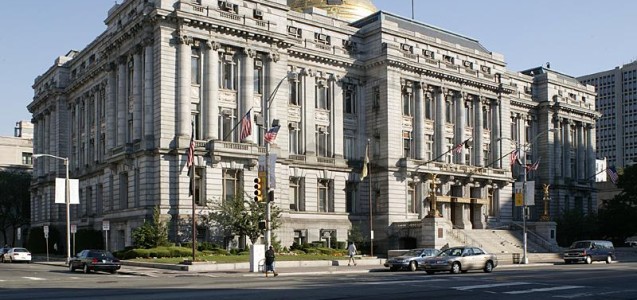By Walter Elliott
NEWARK – The City of Newark will be taking its case for a Civilian Complaint Review Board with investigative and subpoena powers to the United States Supreme Court and the New Jersey State Legislature.
Those two approaches are the next steps Ras Baraka and his administrators said here, Aug. 25, will take in response to the New Jersey Supreme Court’s Aug. 19 ruling that denied the powers to investigate complaints and subpoena individuals.
“We’re going to appeal – we’re going to fight this case,” said Baraka Tuesday morning on the City Hall front steps Tuesday morning before an audience of 70. “This is necessary – and we’re going to win. We’ve an opportunity to win together.”
Thirty supporters – including Municipal Council members, Orange Mayor Dwayne D. Warren and Jersey City’s Steve Fulop, the Newark Law Department,, NJ-ACLU, Mayor’s Clergy Liaison Scott-Rountree and colleagues and People’s Organization for Progress founder Lawrence Hamm – stood with Baraka during the hour-long announcement.
Some of the standees and audience were with the mayor Aug. 20 when he declared, “We can’t run with anger, which goes away after a month or two. We have to run with commitment,” the day after SCONJ’s ruling.
The SCONJ justices – in their 52-page ruling and six-page syllabus Aug. 19 – ruled that the Municipal Council had not the authority to delegate its subpoena power to the Newark CCRB in 2016. Ordinance 6PSFB-2020, the five justices found, violated state law where police department discipline rests with the police chief, police director or director of public safety.
The subpoena part of the ruling reverses a June Appellate Court ruling – which allowed the power but kept complainants and police officers’ names confidential and the CCRB’s directives to the chief or director non-binding.
The majority of justices further ruled that the police department’s internal affairs investigation takes priority over the CCRB’s probe. The civilian panel would therefore have to wait for evidence and testimony until IA’s turn was done.
“To understand how we got here:” said Newark Corporate Counsel Kenyatta K. Stewart Tuesday morning while holding an index finger up. “Of all the complaints brought to Newark Police IA for investigation between 2007 and 2012, they filed charges against only one officer.”
Stewart and First Assistant Counsel Avion Benjamin had spearheaded Newark’s case and appealed through state Superior and Appellate courts to SCONJ. Benajmin made the oral argument before the state’s high court April 27. Oral arguments were also made by lawyers for Fraternal Order of Police Lodge 12 and the N.J. State Association of Police Chiefs.
Amicus briefs were filed by the state Attorney General’s Office and NJACLU.
“We thank Chief Justice (Stuart) Rabner for his dissent,” said Baraka. “We hope that his opinion will affect his fellow justices.”
“The (State) Supreme Court found value in having a civilian oversight board,” said Stewart. “What they said was that the powers to subpoena and to investigate are not spelled out in state law.”
Newark is the only New Jersey municipality who has created a CCRB. The Orange Municipal Council is considering one, as is Jersey City Mayor Fulop. Maplewood’s Community Board on Police has been holding monthly meetings since Nov. 1, 2018.
Baraka, who has been advocating for a CCRB for four decades, said he has been getting calls from other N.J. municipalities’ mayors .He said he has support from East Orange’s Theodore “Ted” Green, Irvington’s Anthony “Tony” Vauss, Hillside’s Dahlia Vertreese and Plainfield’s Adrian Mapp although they were unable to appear Tuesday.
“I got a call from a mayor whose name and town I won’t say,” added Baraka. “She was asking about a civilian review board – and her municipality is majority white. The legislation we’re working on will not only help Newark and Jersey City but Camden, Trenton and Atlantic City.”
The mayor was talking about a bill to go before the State Legislature in Trenton that will give municipalities and counties the ability to establish CCRBs with the rights to access documents and summon witnesses in their investigations. A town will have the choice to join a county board or have one of its own.
“A municipality may form a CCRB with three options,” said Stewart. “A mayor may ask the council to form one or the council can form one independently.
Citizens of a community may petition their government to put a CCRB question on the ballot.”
“This can include sheriff’s officers,” added Baraka in answering a reporter’s question. “All law enforcement should have oversight since they work for the people. The military has oversight.”
A General Assembly bill is being drafted by Angela McKnight (D-Jersey City) The McKnight bill is sponsored by Cleopatra Tucker (D-Newark), Shavonda Sumter (D-Paterson), Benjie Wimberly (D-Paterson) and State Sen. Ron Rice (D-Newark). There is also a Senate bill which, Baraka said, Essex and Passaic county state legislators are working to combine with McKnight’s bill.
“Having a civilian oversight board,” said Mayor Warren, “will help the police department root out the few ne’er-do-wells who do not uphold ‘serve and protect.’ “
“One of the realities I found was that police hirings, promotions through the (State) Civil Service are done solely by the test,” said Mayor Fulop. “The other is that New Jersey is the only state where the chief of police has the final say in discipline and with the police budget.”


